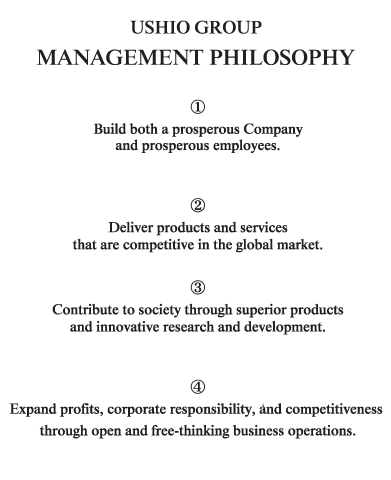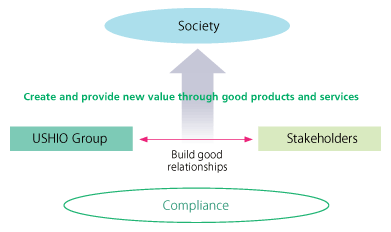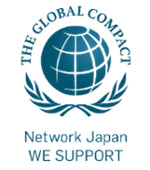Fundamental Concept
The USHIO Group’s management philosophy, which underpins all its employees’ activities, was revised in fiscal 2004. Following its revision, the philosophy retained the spirit of the Basic Policy formulated when the company was first founded, whilst also reflecting the new social concerns that had emerged with a new era. Thus, the requirement to fulfill our corporate social responsibility became a core tenet.

10 Action Guidelines
To translate our management philosophy into concrete action, we abide by the 10 Action Guidelines listed below. These guidelines shape the goals and behavior of every USHIO employee.
| 1. | We shall aim to be a company that accepts diverse individual qualities and values and where people work together and pursue self-learning and self-improvement. |
| 2. | We shall strive for the company’s sustainable growth through our innovative, proactive and prompt management. |
| 3. | We shall respect the basic human rights of all individuals and endeavor to create a bright, safe and pleasant working environment. |
| 4. | We shall provide high-quality, safe products and services at appropriate prices and carry out fair and equitable business transactions. |
| 5. | We shall work to earn the understanding and trust of society. |
| 6. | We shall comply with laws and regulations and carry out fair business activities in accordance with socially accepted practices. |
| 7. | We shall fulfill our duties to the best of our abilities in conformity with internal regulations and standards. |
| 8. | We shall promote environmental protection and the efficient use of resources. |
| 9. | We shall carry out proactive public relations activities while respecting the value of information and intellectual property rights of third parties. |
| 10. | We shall contribute to the development of respective regions where we conduct business as a member of the international community. |
Approach to Corporate Social Responsibility (CSR)

We consider it natural that a corporate citizen should observe compliance practices, contribute to society, and take steps to protect the environment. These are the foundations of all corporate activity.
In addition, a corporation should build good relationships with its various stakeholders and advance by creating and offering new value to contribute to society. This is the kind of corporation that USHIO is working to become.
Major Activities
Formulation of a CSR Action Plan
USHIO has created a CSR Action Plan (Policy) and taken steps to reinforce its CSR initiatives. Through dialogue with stakeholders, we have identified relationships between various social issues and our core businesses. To emphasize carrying out initiatives in line with our business strategy, we have set out basic principles in our Action Plan, which we incorporate into the strategies of each division and department.
USHIO CSR Action Plan (Policy)
| Five pillars | Issues | |
| Governance | Establish compliance activities that encompass international standards in global corporate activities, work to publicize CSR-related information and establish stakeholder communication, and strengthen and enhance the governance framework. |
|
| People | Consider workplace environments, human rights, and diversity of values in hiring and using human resources. |
|
| Quality | Initiatives to meet the needs of customers, shareholders, and business partners based on observance of market rules and regulations. Creation of a social business. |
|
| Society | Engage widely with society at all levels from local to international, cooperating and coordinating with other groups in contributing to education, culture, welfare, development and other aspects of society. |
|
| Environment | Engage in corporate activities to protect the environment. Strive to meet both environmental and business needs, including addressing global environmental problems affecting biotopes. |
|
Supporting the United Nations Global Compact’s Ten Principles
USHIO formally declared its support for the United Nations Global Compact of principles concerning human rights, labor, the environment and anti-corruption in October 2010. We also joined Global Compact Japan Network, the local UN Network supporting the compact. Through this organization, we are sharing information with numerous other member companies on specific measures necessary to address the principles’ various CSR-related requirements. We are also taking an active role in sectional activities aimed at helping member companies to meet the compact’s goals.
United Nations Global Compact’s Ten Principles
| Human Rights | Principle 1: Businesses should support and respect the protection of internationally proclaimed human rights; and Principle 2: make sure that they are not complicit in human rights abuses. |
| Labor | Principle 3: Businesses should uphold the freedom of association and the effective recognition of the right to collective bargaining; Principle 4: the elimination of all forms of forced and compulsory labor; Principle 5: the effective abolition of child labor; and Principle 6: the elimination of discrimination in respect of employment and occupation. |
| Environment | Principle 7: Businesses should support a precautionary approach to environmental challenges; Principle 8: undertake initiatives to promote greater environmental responsibility; and Principle 9: encourage the development and diffusion of environmentally friendly technologies. |
| Anti-Corruption | Principle 10: Businesses should work against corruption in all its forms, including extortion and bribery. |
